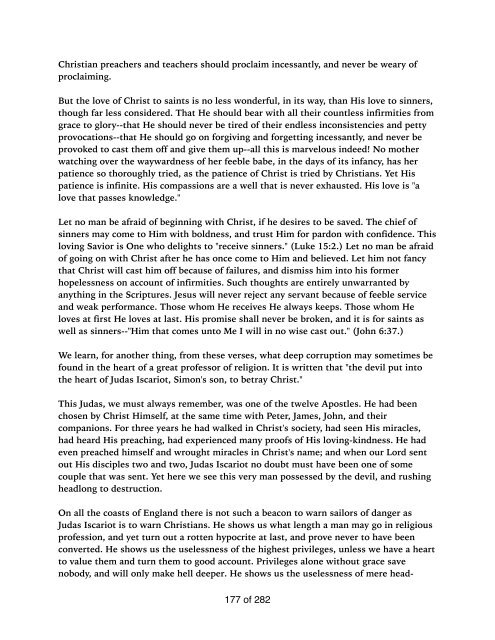The Gospel of John By J.C. ryle
Expository Thoughts on the Gospels Volume 4: John. Ignorance of Scripture is the root of every error in religion, and the source of every heresy. To be allowed to remove a few grains of ignorance, and to throw a few rays of light on God's precious word, is, in my opinion, the greatest honor that can be put on a Christian.
Expository Thoughts on the Gospels Volume 4: John. Ignorance of Scripture is the root of every error in religion, and the source of every heresy. To be allowed to remove a few grains of ignorance, and to throw a few rays of light on God's precious word, is, in my opinion, the greatest honor that can be put on a Christian.
You also want an ePaper? Increase the reach of your titles
YUMPU automatically turns print PDFs into web optimized ePapers that Google loves.
Christian preachers and teachers should proclaim incessantly, and never be weary <strong>of</strong><br />
proclaiming.<br />
But the love <strong>of</strong> Christ to saints is no less wonderful, in its way, than His love to sinners,<br />
though far less considered. That He should bear with all their countless infirmities from<br />
grace to glory--that He should never be tired <strong>of</strong> their endless inconsistencies and petty<br />
provocations--that He should go on forgiving and forgetting incessantly, and never be<br />
provoked to cast them <strong>of</strong>f and give them up--all this is marvelous indeed! No mother<br />
watching over the waywardness <strong>of</strong> her feeble babe, in the days <strong>of</strong> its infancy, has her<br />
patience so thoroughly tried, as the patience <strong>of</strong> Christ is tried by Christians. Yet His<br />
patience is infinite. His compassions are a well that is never exhausted. His love is "a<br />
love that passes knowledge."<br />
Let no man be afraid <strong>of</strong> beginning with Christ, if he desires to be saved. <strong>The</strong> chief <strong>of</strong><br />
sinners may come to Him with boldness, and trust Him for pardon with confidence. This<br />
loving Savior is One who delights to "receive sinners." (Luke 15:2.) Let no man be afraid<br />
<strong>of</strong> going on with Christ after he has once come to Him and believed. Let him not fancy<br />
that Christ will cast him <strong>of</strong>f because <strong>of</strong> failures, and dismiss him into his former<br />
hopelessness on account <strong>of</strong> infirmities. Such thoughts are entirely unwarranted by<br />
anything in the Scriptures. Jesus will never reject any servant because <strong>of</strong> feeble service<br />
and weak performance. Those whom He receives He always keeps. Those whom He<br />
loves at first He loves at last. His promise shall never be broken, and it is for saints as<br />
well as sinners--"Him that comes unto Me I will in no wise cast out." (<strong>John</strong> 6:37.)<br />
We learn, for another thing, from these verses, what deep corruption may sometimes be<br />
found in the heart <strong>of</strong> a great pr<strong>of</strong>essor <strong>of</strong> religion. It is written that "the devil put into<br />
the heart <strong>of</strong> Judas Iscariot, Simon's son, to betray Christ."<br />
This Judas, we must always remember, was one <strong>of</strong> the twelve Apostles. He had been<br />
chosen by Christ Himself, at the same time with Peter, James, <strong>John</strong>, and their<br />
companions. For three years he had walked in Christ's society, had seen His miracles,<br />
had heard His preaching, had experienced many pro<strong>of</strong>s <strong>of</strong> His loving-kindness. He had<br />
even preached himself and wrought miracles in Christ's name; and when our Lord sent<br />
out His disciples two and two, Judas Iscariot no doubt must have been one <strong>of</strong> some<br />
couple that was sent. Yet here we see this very man possessed by the devil, and rushing<br />
headlong to destruction.<br />
On all the coasts <strong>of</strong> England there is not such a beacon to warn sailors <strong>of</strong> danger as<br />
Judas Iscariot is to warn Christians. He shows us what length a man may go in religious<br />
pr<strong>of</strong>ession, and yet turn out a rotten hypocrite at last, and prove never to have been<br />
converted. He shows us the uselessness <strong>of</strong> the highest privileges, unless we have a heart<br />
to value them and turn them to good account. Privileges alone without grace save<br />
nobody, and will only make hell deeper. He shows us the uselessness <strong>of</strong> mere head-<br />
177 <strong>of</strong> 282

















